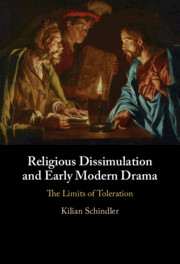Refine search
Actions for selected content:
3 results
Chapter 1 - Religious Dissimulation and Toleration in Early Modern England
-
- Book:
- Religious Dissimulation and Early Modern Drama
- Published online:
- 31 August 2023
- Print publication:
- 28 September 2023, pp 27-47
-
- Chapter
-
- You have access
- Open access
- HTML
- Export citation
Chapter 2 - From Oldcastle to Falstaff
-
- Book:
- Religious Dissimulation and Early Modern Drama
- Published online:
- 31 August 2023
- Print publication:
- 28 September 2023, pp 48-73
-
- Chapter
-
- You have access
- Open access
- HTML
- Export citation

Religious Dissimulation and Early Modern Drama
- The Limits of Toleration
-
- Published online:
- 31 August 2023
- Print publication:
- 28 September 2023
-
- Book
-
- You have access
- Open access
- Export citation
